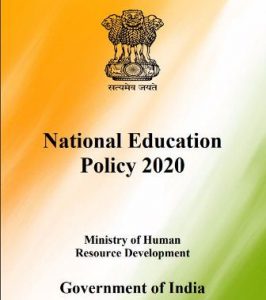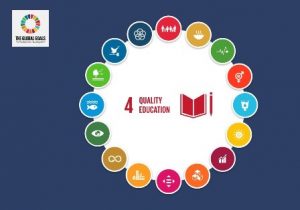SDGs and India’s New National Education Policy 2020
India’s new National Education Policy paves a way to a more holistic and inclusive learning, based on inquiry, discovery, discussion and analysis.
Quality education is the backbone for growth of any society and education policy is the way to attain it. In India, after three decades, the National Education Policy 2020 (NEP-2020) has been introduced by the current government.NEP was one of the agendas ofthe2014 election campaign of the  Bharatiya Janata Party (BJP) This overhaul of education system of India was the need of hour to transform the future of all the children and youth in the country. The NEP 2020 is also in the line of Goal 4 of the United Nations Sustainable Development Goals (SDG 2030), which clearly believes equal access to education is the base of sustainable development. By aliening SDG targets into NEP, the government has ensured the success of self-reliance campaign of the nation through providing equal education to all. NEP 2020 will strengthen all the citizens of the country by enhancing their skills and knowledge. Furthermore, it clearly talks about the complete overhauling of Indian educational system from pre-primary to higher education along with curricular reform to institutional reform in a phased manner, which will help India to achieve SDG objectives.
Bharatiya Janata Party (BJP) This overhaul of education system of India was the need of hour to transform the future of all the children and youth in the country. The NEP 2020 is also in the line of Goal 4 of the United Nations Sustainable Development Goals (SDG 2030), which clearly believes equal access to education is the base of sustainable development. By aliening SDG targets into NEP, the government has ensured the success of self-reliance campaign of the nation through providing equal education to all. NEP 2020 will strengthen all the citizens of the country by enhancing their skills and knowledge. Furthermore, it clearly talks about the complete overhauling of Indian educational system from pre-primary to higher education along with curricular reform to institutional reform in a phased manner, which will help India to achieve SDG objectives.
The last NEP was introduced in 1986 and was updated in1992. Since then no changes had been made in education policy in India. Ever changing socio-economic conditions of country demands the overall transformation of education system to achieve the goals fixed by UN from the Millennium Development Goals (MDGs) to SDGs. Keeping that in view a committee was formed under the chairmanship of K. Kasturirangan, Ex ISRO chief, to draft the NEP 2020. The main objective of NEP 2020 is to establish India as “a global knowledge superpower” by providing quality education, by encouraging innovation and by cultivating sound research culture.
The SDGs 2030 targets to ensure primary and secondary education for all (including boys and girls), and also equal access of quality technical and vocational education to everyone in all the member states of UN. By 2030, it is expected from each member states of UN to ensure that all girls and boys complete free, equitable and quality primary and secondary education leading to relevant and Goal-4 effective learning outcomes. Furthermore, it also emphasises on ensuring that all girls and boys have access to quality early childhood development, care and pre-primary education so that they are ready for primary education.
Also Read : Shravasti: From Enlightenment to Education
Following the above principles of SDG, NEP 2020 is based on five pillars: Access, affordability, equity, quality and accountability. It introduces a four-stage pedagogical structure as foundational stage, preparatory stage, middle stage and secondary stage.
NEP 2020 is based on the 5+3+3+4 years system instead of 10+2 system. At the foundational level, the focus of the policy is to encourage play and activity based learning among children.
The preparatory stage emphasises on developing language and numeracy skills. It also has a provision for learning of three languages, among which at least two languages should be native or regional or local. The middle stage introduces more experience and critical learning rather than rote learning. The secondary stage put forth multidisciplinary education providing students the leeway of opting subjects of their interests by removing the rigid separation of arts and science.
Changes in examination pattern have been introduced to ensure more progressive approach, to opt amore scientific nature, to ensure cognitive development of students by enabling them to construct a thought process, consisting of remembering things, solving the problems and decision-making, through all the stages of growth, i.e., from childhood to adulthood. The main objective of examination now will be to assess the core capabilities of students, testing their understanding of concepts and application of knowledge rather than focusing on mugging up answers to obtaining marks. As per the NEP 2020 “Boards may over time also develop further viable models of Board Exams, such as – annual/semester/modular board exams; offering all subjects beginning with mathematics, at two levels; two parts exams or objective type and descriptive type.”
While providing students the flexibility in the duration of a programme, the policy has launched a four-year degree course with multiple exits. The students will have a choice to exit the course after one year with a certificate for the course or they can complete two years and exit with a diploma for the same. If students are willing to get a bachelor’s degree, they can get it by completing three-year course, and after the completion of four-year along with a project student can get bachelor’s degree with research. The MPhil degree has been discontinued so that students could pursue PhD directly after completing their masters.
 UNSDG has another target to ensure, which is equal access for all women and men to affordable and quality technical, vocational and tertiary education, including university. Member states are to increase substantially the number of youth and adults who have technical and vocational skills, for employment, decent jobs and entrepreneurship. Furthermore, SDG 4 has a target of elimination of gender disparities in education and ensure equal access to all levels of education and vocational training for the vulnerable, including persons with disabilities, indigenous peoples and children in vulnerable situations.
UNSDG has another target to ensure, which is equal access for all women and men to affordable and quality technical, vocational and tertiary education, including university. Member states are to increase substantially the number of youth and adults who have technical and vocational skills, for employment, decent jobs and entrepreneurship. Furthermore, SDG 4 has a target of elimination of gender disparities in education and ensure equal access to all levels of education and vocational training for the vulnerable, including persons with disabilities, indigenous peoples and children in vulnerable situations.
NEP 2020 also emphasises the significance of vocational knowledge and has provision to integrate it in the mainstream courses. There will be internship opportunities to students to learn skills. It introduces at least 10 days bagless periods in school where students will get a chance to interact with vocational experts at the local level, for example; carpenters, gardeners, artists, potters, etc., to gain hands on experience and develop the skills.
Making education more affordable to all, the NEP outlines that the standard of audit and disclosure should be similar for all educational institutions as “non for-profit entity”. Also, if there is any surfeit, it has to be reinvested in educational sector. There should be transparency in all financial matters and mechanism to address the grievances of public should be made. The policy states that all the provisions related to fees and charges by private higher education institutions should be transparent and disclosed and institutions should not increase the fees arbitrarily.
Also Read : Making education a priority in Saharanpur’s quaint village
The NEP envisages to de-bureaucratise and to provide more autonomy to educational institutions. It tends to give governance powers to academicians by increasing their say in the decision-making process. It aims to delegate autonomy to institutions through Board of Governors, which will include chiefly academicians and educationists. Greater autonomy will ensure less political interference in education, thus leading to de-politicisation of education system. The Establishment of Board of Governors will also ensure the fair appointment of head of institutions keeping it away from political interference. This system was introduced in Indian Institute of Management (IIMs) by Modi government in 2017, and now the policy aims to expand it to other institutions as well. It is a classic example of good governance and empowerment.
Another major focus of NEP 2020 to achieve the targets of UNSDG on education is increasing technological advancement at all the level of education, so that the classroom experience and process could be improved. Technological advancement will lead to professional developments among teachers. The SDG2030 clearly encourages member states to increase the supply of qualified teachers through international cooperation. Recognising that India’s NEP encourages to train teachers to develop high-quality content as well as pedagogyand includes strong practicum training in the form of student-teaching at local schools. Moving towards to achieving SDG targets, teacher education in India will gradually be moved by 2030 into multidisciplinary colleges and universities. The rationale of the new NEP to providing training and enhancing capacity of faculty is to make them able to approach students not just as teachers in the classroom, but also as mentors and guides.
Using technology platforms such as SWAYAM /DIKSHA for online training, teachers shall be encouraged so that standardised training programmes can be administered to large number of teachers within a short span of time.
NEP advocates to establish National Educational Technology Forum (NETF), a forum which will provide a platform where free exchange of ideas could take place on the use of technology so that learning, assessment, planning and administration could be enhanced. It will help India to become a global leader in providing quality education not only to Indian youth, but also to youth globally.
UNSDG 2030 emphasises to ensure universal access of education to all, boys and girls, youth and adults, persons with disabilities, indigenous peoples and people living in vulnerable situations. Furthermore, the overarching goal of NEP will be to ensure universal access to high-quality early childhood care and education across the country in a phased manner. Special attention and priority will be given to districts and locations that are particularly socio-economically disadvantaged. To address this, India’s NEP 2020 includes education in local language, creating National Curriculum Framework, educational institution’s culture to be conducive to quality education, upliftment of disadvantaged groups such as disables, girls, SC, ST, OBC, tribal communities, transgender children, economically weaker section, etc., establishment of National Research Foundation, Academic Bank of Credit, more professional and capable faculties, adult education, substantial investment in education sector by investing 6 per cent of GDP against current 1.7 per cent, etc.
India’s NEP 2020 has comprehensive potential for establishing overwhelming impact on the socio-economic fabric of society, as expected in SDG by all the members’ states. It also paves a way to a more holistic and inclusive kind of learning, based on inquiry, discovery, discussion and analysis. Although questions have been raised on the implementation of the new NEP of India, however, it is very imperative to realise that education is in concurrent list subject, and thus the role of units of Indian federation in implementing the policy will also be crucial for the success NEP 2020 in the line of SDGs 2030.
